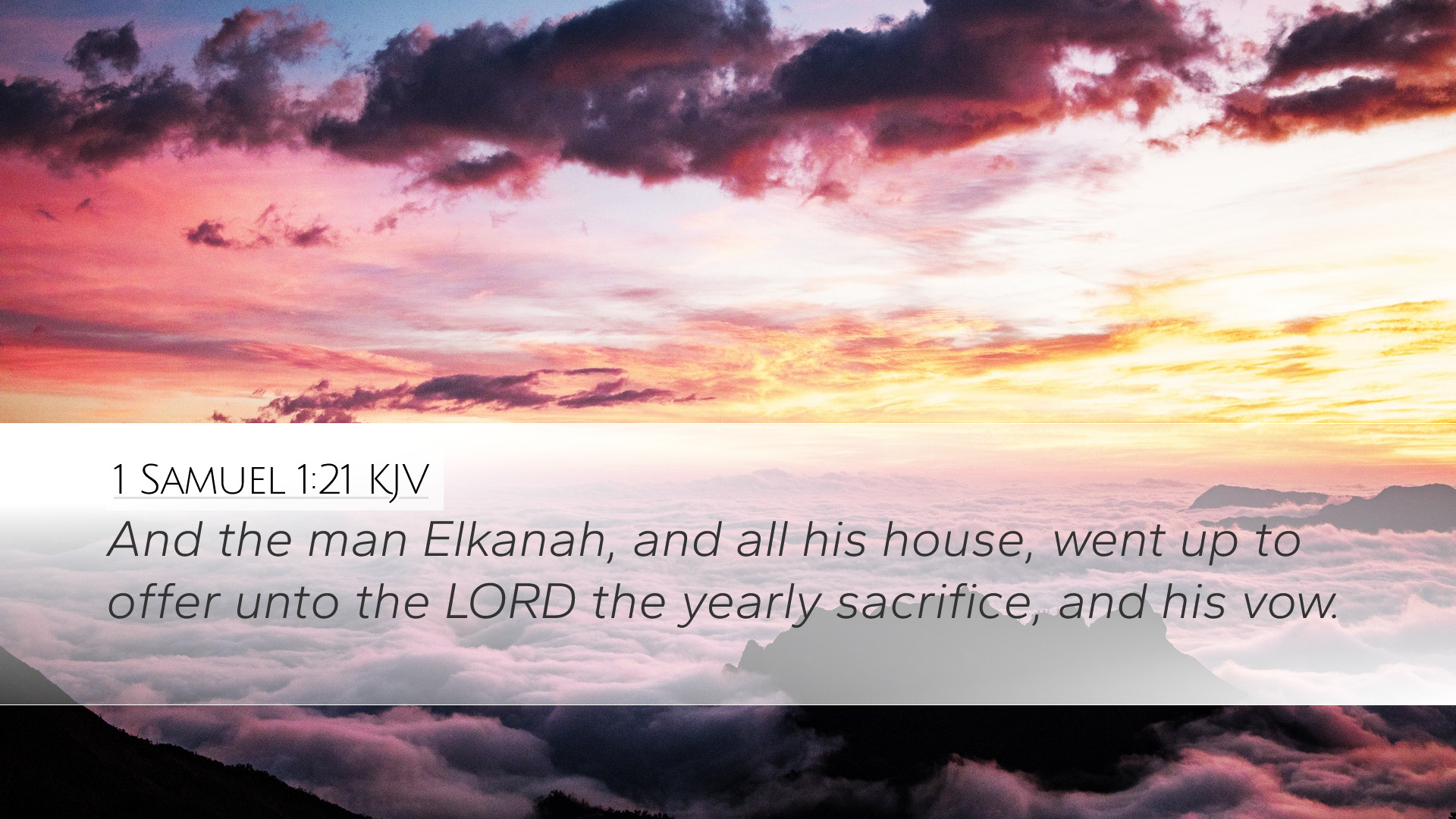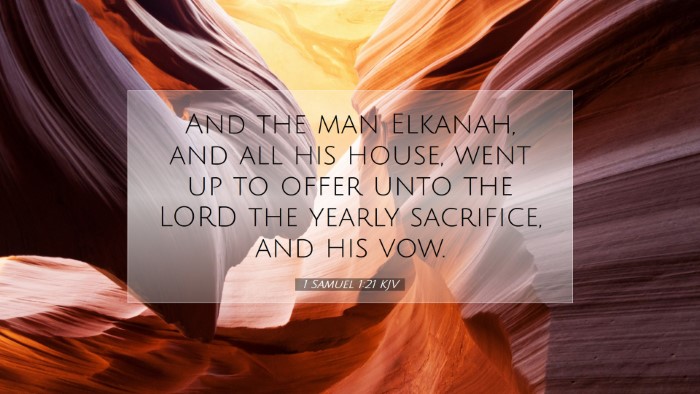Commentary on 1 Samuel 1:21
Verse: 1 Samuel 1:21 (KJV) - "And the man Elkanah, and all his house, went up to offer unto the LORD the yearly sacrifice, and his vow."
Introduction
This verse finds itself within the larger narrative of the story of Hannah, her prayer for a child, and her unwavering faith. The action of Elkanah and his family going to Shiloh for a yearly sacrifice signifies not only obedience to religious duty but also reflects the cultural context of Israelite worship during the period of the judges.
Exegesis and Insights
1. Elkanah's Faithfulness
Matthew Henry emphasizes Elkanah's piety and faithfulness in fulfilling his religious obligations. He did not neglect his duty to God despite the personal struggles that may have surrounded his family, particularly concerning Hannah's barrenness. His devotion serves as a model for spiritual leadership within the household. It highlights the importance of family participation in worship and collective faith.
2. The Yearly Sacrifice
Albert Barnes notes that the yearly sacrifice represents an important aspect of covenant renewal and communal identity among the Israelites. Such sacrifices were mandated by the Law as a means to atone for sin and express gratitude to God. This context allows readers to appreciate the significance of tradition and liturgical observance in ancient Israel.
3. The Vow
Adam Clarke insightfully remarks on the significance of vows made to God. Elkanah’s vow suggests a deeper personal commitment to God’s service and reflects Hannah’s earlier promise regarding the child she hoped to receive. The act of vowing and its fulfillment is an important theme in scriptural practice, illustrating the seriousness with which the faithful ought to approach their commitments to God.
4. The Role of Family in Worship
The mention of “all his house” implies the communal aspect of worship and the inclusion of family members in spiritual activities. Henry remarks that family worship is crucial for nurturing faith in the next generation. The family's involvement in sacrificial offerings underscores the shared spiritual journey that individuals embark upon within a familial structure.
Theological Implications
1. God’s Sovereignty and Human Responsibility
This verse exemplifies the intersection of divine sovereignty and human responsibility. While Hannah's prayer was pivotal in seeking God’s intervention in her barrenness, the act of offering sacrifices alludes to the notion that faith is not passive. Barnes points out that God's providence operates alongside human initiative. The faithful should actively engage in worship while trusting in God’s overarching plan.
2. The Importance of Acts of Worship
Worship practices are essential for the cultivation of spiritual vitality and community. Clarke indicates that participation in sacrificial rites formalizes the believer’s relationship with God and reaffirms covenantal commitments. In a contemporary context, this accentuates the relevance of church attendance and communal worship as indispensable components of Christian life.
3. The Expectation of Answered Prayer
Following the sacrificial act, there is an implicit expectation that God listens to the prayers of His people. The journey to offer sacrifices is emblematic of faith that expects to meet with God. Henry reflects on the grit of faith—how it persists even when circumstances seem dire. It challenges believers to understand prayer not merely as a request but as a dynamic interaction with the divine.
Practical Applications
- Encouragement for Family Worship: Pastors should promote the importance of family worship, encouraging households to come together to honor God similarly to Elkanah's family.
- Commitment to Spiritual Duties: Elkanah’s example inspires believers to commit to their spiritual duties and to ensure their acts of worship are regular and meaningful.
- Understanding Vows: The lesson about taking vows seriously can serve as a theological reminder for congregants about the nature of commitments made to God and the importance of fulfilling them.
- Expectant Faith: Believers are encouraged to pray expectantly, trusting that their efforts in worship and prayer invite God’s intervention in their circumstances.
Conclusion
1 Samuel 1:21 serves as a multifaceted verse rich in theological and practical implications. Elkanah’s actions reveal the vitality of communal worship, the significance of fulfilling one’s vows, and the expectation of God’s attentiveness to prayer. For pastors, students, theologians, and Bible scholars, this passage encourages rigorous reflection on the nature of faith, worship, and familial roles within the life of the believer.


